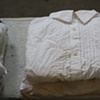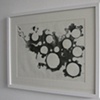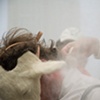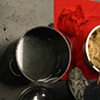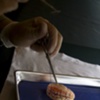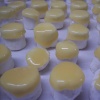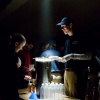
A series of curious experiments.
My work investigates the need for spiritual belonging – however it may be defined – as well as the systems and products that provide it. As the grandson of charismatic faith healers and the son of business brokers, I have an endless fascination with the economy and commerce of the internal and external self. This manifests in my work as an exploration of the tenuous connections between anatomical tissue, cultural identity, and the labor required to produce divine experience.
My art practice is interdisciplinary, utilizing performance, video and sculptural installation alongside pharmaceutical manufacturing processes and medical therapies in order to examine the connection of our bodies to our spirits. I design procedures, equipment and tasks to work the body and the soul through the mechanics of religious ritual, physical labor, and consumption.
A main focus of my research is spiritual appropriation as the point of access for the U.S. consumer. U.S. citizens are notorious for their predilection for consumption as a means of accomplishing a task. As the market for pharmaceuticals, sports drinks and self-help books suggest, it is easier to buy something, eat, drink or pay someone to do the difficult work for you. The same idea applies to spiritual practice. If a culture can be fragmented, documented, replicated and sold, the seeker is given a point of access from which to collect and piece together a religious practice or some sense of identity over time.
This acknowledgment of the problematic nature of trans-cultural spiritual consumption stems from my own involvement in the Afro-Cuban religious community despite my upbringing as a white, southern protestant. As both a critical thinker and an active participant in cultural appropriation I recognize the conflict between co-optation, social responsibility and the spiritual desires of the colonizing devotee.
By activating the body and its materials through ritualized labor, my work creates liminal spaces for both cultural critique and contemplation of the needs of the spirit, whether that be security, healing, or just a sense of belonging.
My work investigates the need for spiritual belonging – however it may be defined – as well as the systems and products that provide it. As the grandson of charismatic faith healers and the son of business brokers, I have an endless fascination with the economy and commerce of the internal and external self. This manifests in my work as an exploration of the tenuous connections between anatomical tissue, cultural identity, and the labor required to produce divine experience.
My art practice is interdisciplinary, utilizing performance, video and sculptural installation alongside pharmaceutical manufacturing processes and medical therapies in order to examine the connection of our bodies to our spirits. I design procedures, equipment and tasks to work the body and the soul through the mechanics of religious ritual, physical labor, and consumption.
A main focus of my research is spiritual appropriation as the point of access for the U.S. consumer. U.S. citizens are notorious for their predilection for consumption as a means of accomplishing a task. As the market for pharmaceuticals, sports drinks and self-help books suggest, it is easier to buy something, eat, drink or pay someone to do the difficult work for you. The same idea applies to spiritual practice. If a culture can be fragmented, documented, replicated and sold, the seeker is given a point of access from which to collect and piece together a religious practice or some sense of identity over time.
This acknowledgment of the problematic nature of trans-cultural spiritual consumption stems from my own involvement in the Afro-Cuban religious community despite my upbringing as a white, southern protestant. As both a critical thinker and an active participant in cultural appropriation I recognize the conflict between co-optation, social responsibility and the spiritual desires of the colonizing devotee.
By activating the body and its materials through ritualized labor, my work creates liminal spaces for both cultural critique and contemplation of the needs of the spirit, whether that be security, healing, or just a sense of belonging.







